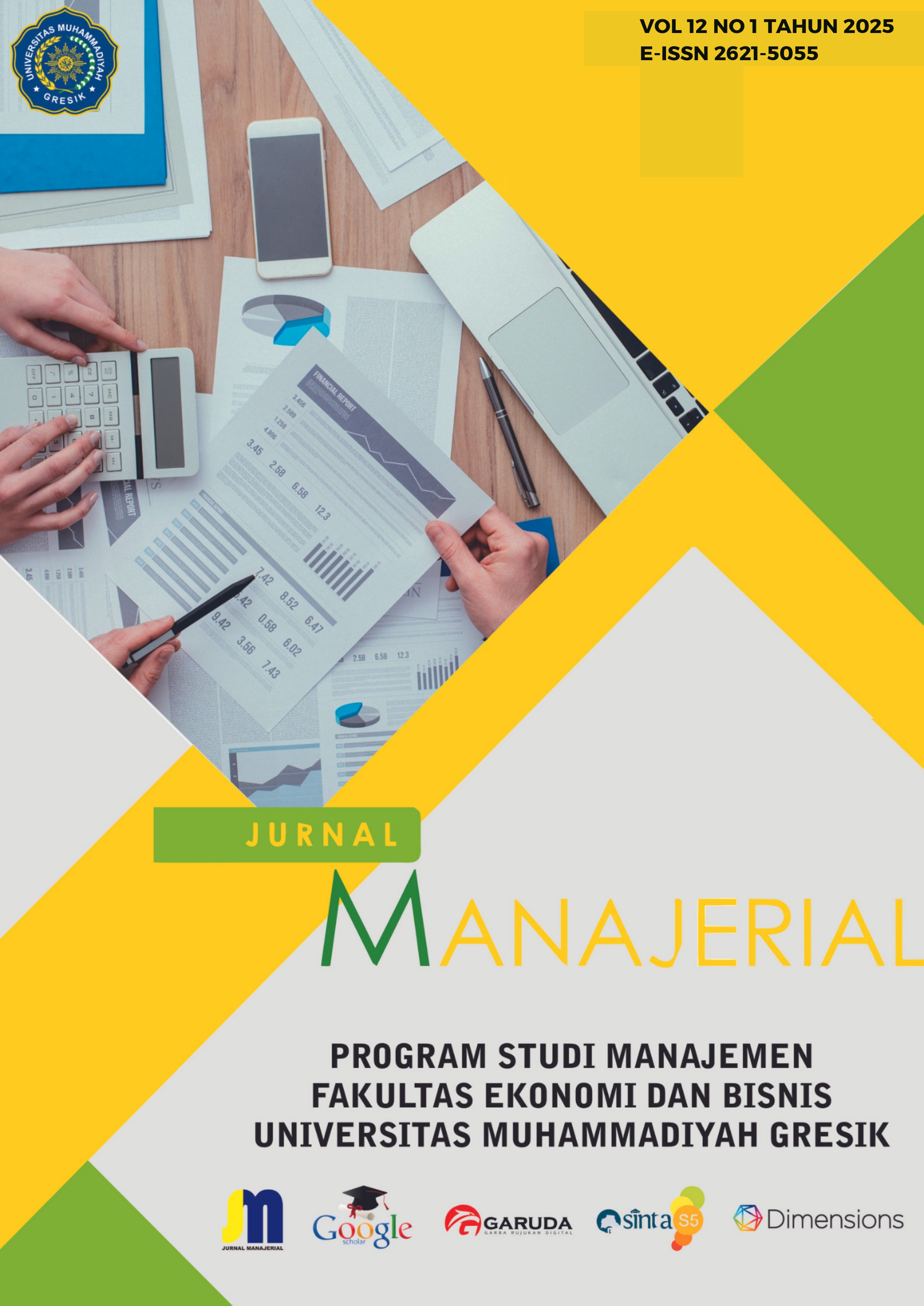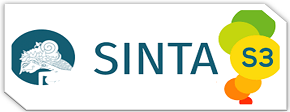Faktor – Faktor yang Mempengaruhi Perilaku Kerja Gen Z Terhadap Kinerja Karyawan
DOI:
https://doi.org/10.30587/jurnalmanajerial.v12i01.8362Keywords:
Employee Performance, Work Behavior, Work Motivation, Job Satisfaction, Leadership, Work EnvironmentAbstract
Background – The high turnover among Gen-Z and millennials is influenced by a lack of work motivation, job dissatisfaction, an inharmonious work environment, and ineffective leadership. As a result, Gen-Z work behavior becomes inconsistent, which can have a negative influence on company performance. Therefore, it is important to emphasize job satisfaction and effective leadership to increase employee retention. So, employees can form positive and consistent work behaviors so that employees can effectively increase work productivity to achieve overall organizational success.
Aim – This research seeks to explore how Work Motivation, Job Satisfaction, Leadership, and Work Environment affect the performance of Gen-Z employees. It specifically examines the role of Work Behavior as a mediator that links these factors to Employee Performance.
Design/Methodology/Approach – This study uses a quantitative approach with purposive sampling. Data were collected via a Google Forms questionnaire and analyzed using SPSS and SmartPLS statistics..
Results and Discussion – The results of the study show that Work Motivation, Job Satisfaction, and Leadership significantly affect Employee Performance, both directly and through Work Behavior. In contrast, the Work Environment is insignificant, highlighting Gen Z's preference for intrinsic values and leadership over physical elements. Work Behavior mediates the relationship between Job Satisfaction and Leadership and performance, but not for Work Motivation and Work Environment. This research emphasizes the importance of job satisfaction, effective leadership, and value-based motivation to encourage positive work behaviors and increase productivity.
Research Implications – This research highlights the importance of job satisfaction, transformational leadership, and value-based motivation to improve Gen Z's work behavior and performance.
Limitations – The limitations of this study include a limited of respondents, namely employees in the electronics manufacturing sector in Batam City. In addition, the measurement of work behavior variables is only carried out in certain aspects.
References
Afsar, B., & Umrani, W. A. (2020). Transformational leadership and innovative work behavior: The role of motivation to learn, task complexity and innovation climate. European Journal of Innovation Management, 23(3), 402–428. https://doi.org/10.1108/EJIM-12-2018-0257
Afza, R., Siregar, D. I., & Zaki, H. (2022). Analisis Pengaruh Kepemimpinan Transformasional Dan Perilaku Kerja Inovatif Terhadap Kinerja Karyawan DeReMa (Development Research of Management):Jurnal Manajemen, 17(1), 118–130. https://doi.org/10.19166/DEREMA.V17I1.4170
Akbar, M., Yunus, M., & Syahribulan, S. (2022). Pengaruh Perilaku Kerja dan Komitmen Organisasi Terhadap Kinerja Pegawai di Dinas Penanaman Modal dan Pelayanan Terpadu Satu Pintu Provinsi Sulawesi Barat. Kolaborasi : Jurnal Administrasi Publik, 8(2), 242–258. https://doi.org/10.26618/kjap.v8i2.8441
Arsawan, I. W. E., Kariati, N. M., Shchokina, Y., Prayustika, P. A., Rustiarini, N. W., & Koval, V. (2022). Invigorating employee’s innovative work behavior: exploring the sequential mediating role of organizational commitment and knowledge sharing. Business: Theory and Practice, 23(1), 117-130–117–130. https://doi.org/10.3846/BTP.2022.15684
Barasa, L., Togatorop, A. L., & Szeze, M. (2021). Pengaruh Perilaku Kerja Terhadap Kinerja Karyawan Pada PT. Sumberbumi Global Niaga. Meteor STIP Marunda, 14(2), 100–129. https://doi.org/10.36101/msm.v14i2.201
Farid, R., & Satia, A. (2023). Pengaruh Motivasi, Lingkungan Kerja, dan Kompensasi Terhadap Kinerja Karyawan Generasi Z di Kota Batam. BALANCE: Economic, Business, Management and Accounting Journal, 20(2), 162. https://doi.org/10.30651/BLC.V20I2.18585
Fathiyah, F., Andriani, Z., & Fitriaty, F. (2022). Pengaruh Kepemimpinan Transformasional dan Motivasi Kerja terhadap Kinerja Karyawan dengan Perilaku Kerja Inovatif sebagai Variabel Mediasi pada Pegawai Dinas Penanaman Modal dan Pelayanan Terpadu Satu Pintu Kabupaten Muaro Jambi. Jurnal Ilmiah Universitas Batanghari Jambi, 22(3), 2269–2275. https://doi.org/10.33087/JIUBJ.V22I3.3057
Fauziek, E., & Yanuar, Y. (2021). Pengaruh Kepuasan Kerja Terhadap Kinerja Karyawan Dengan Stres Kerja Sebagai Variabel Mediasi. Jurnal Manajerial Dan Kewirausahaan, 3(3), 680–687. https://doi.org/10.24912/JMK.V3I3.13155
Hair, J. F., Risher, J. J., Sarstedt, M., & Ringle, C. M. (2019). When to use and how to report the results of PLS-SEM. European Business Review, 31(1), 2–24. https://doi.org/10.1108/EBR-11-2018-0203
Henseler, J., & Chin, W. W. (2010). A comparison of approaches for the analysis of interaction effects between latent variables using partial least squares path modeling. Structural Equation Modeling, 17(1), 82–109. https://doi.org/10.1080/10705510903439003
Herlina, M. G., & Saputra, N. (2021). Does motivation play moderating role on organizational citizenship behavior? Evidence from Indonesian telecommunication firms. Management Science Letters, 1667–1676. https://doi.org/10.5267/J.MSL.2020.12.004
Idrus, Y., Rauf, A., Bempah, I., Agribisnis, J., Pertanian, F., Gorontalo, N., Prof, J., Habibie, I. B. J., & Bonebolango, K. (2021). Pengaruh Motivasi Terhadap Perilaku Kerja Petani Padi Sawah Di Kelurahan Bolihuangga Kecamatan Limboto Kabupaten Gorontalo. AGRINESIA: Jurnal Ilmiah Agribisnis, 5(3), 198–206. https://doi.org/10.37046/AGR.V5I3.12316
Inang, N. I. (2021). E Effect Of Leadership and Work Motivation on Employee Performance Through Knowledge Sharing Behavior. Archives of Business Research, 9(11), 34–50. https://doi.org/10.14738/ABR.911.11067
Ratih Tristianingsih, P., Daengs, A. G., & Hidayat, R. (2022). Pengaruh Kepuasan Kerja Dan Lingkungan Kerja Terhadap Kinerja Karyawan. Jurnal Mahasiswa Manajemen Dan Akuntansi, 1(1), 132–142.
https://jurnaluniv45sby.ac.id/index.php/JUMMA45/article/view/210
Kurnia, E. H., Widodo, H. P., & Zuhroh, D. (2022). Pengaruh Motivasi Kerja Dan Lingkungan Kerja Terhadap Kinerja Karyawan. Jurnal Mahasiswa Manajemen Dan Akuntansi, 1(1), 97–103. https://jurnaluniv45sby.ac.id/index.php/JUMMA45/article/view/202
Musringudin, M., Dinihari, Y., & Afriantoni, A. (2021). Job Satisfaction, Organizational Commitment and Organizational Citizenship Behavior of High School Principals. AL-ISHLAH: Jurnal Pendidikan, 13(3), 3030–3039.
https://doi.org/10.35445/ALISHLAH.V13I3.1371
Mutmainnah, M., Ramli, A., & Ruma, Z. (2022). Pengaruh kepemimpinan terhadap kinerja pegawai. Kinerja : Jurnal Ekonomi Dan Manajemen, 19(4), 769–773. https://doi.org/10.30872/JKIN.V19I4.11756
Nastyoko, Y. A. (2022). Pengaruh Kepuasan Kerja dan Lingkungan Kerja Terhadap Kinerja Karyawan melalui Organizational Citizenship Behavior (OCB) sebagai Variabel Intervening pada CV Diar Rahma Wonosari. Jurnal Ekobis Dewantara, 5(3), 299–307. https://doi.org/10.26460/ED_EN.V5I3.1864
Nitawati, E. Y., Iman, N., & Amanda, T. (2023). The Effect Of Leadership Style, Motivation, And Work Discipline On Employee Performance At Pt Mega Daya Motor Surabaya (Mazda, East Java Branch). Journal of Entrepreneurship, 55–63. https://doi.org/10.56943/JOE.V2I3.348
Paparang, N. C. P., Areros, W. A., & Tatimu, V. (2021). Pengaruh Kepuasan Kerja Terhadap Kinerja Pegawai Kantor PT. Post Indonesia di Manado. Productivity, 2(2),119–123. https://ejournal.unsrat.ac.id/v3/index.php/productivity/article/view/33793
Pratiwi, I., Asfar, A. H., Quraysin, I., & Tukiran, M. (2022). Organizational Citizenship Behavior, Leadership Style, Work Motivation And Effect on Employee Performance. Asian Journal of Management, Entrepreneurship and Social Science, 3(01). https://doi.org/10.98765/AJMESC.V3I01.233
Priscilla, Y. G., Waisaka, W., & Asri, D. H. (2023). The Effect of Leadership, Motivation, Work Discipline and Work Environment on Employee Performance at Fast Food Restaurants in Batam. Asian Journal of Management, Entrepreneurship and Social Science, 3(04), 1233–1248. https://ajmesc.com/index.php/ajmesc/article/view/428
Riyanto, S., Endri, E., & Herlisha, N. (2021). Effect of work motivation and job satisfaction on employee performance: Mediating role of employee engagement. Problems and Perspectives in Management, 19(3), 162–174. https://doi.org/10.21511/PPM.19(3).2021.14
Salsabila, P., & Ketenagakerjaan, P. (2021). Pengaruh Kepuasan Kerja Terhadap Perilaku Kewarganegaraan Dalam Organisasi Karyawan Pada Departemen Human Capital Pt Aerofood Indonesia. Jurnal Ilmu Manajemen, 18(2), 98–107.
https://doi.org/10.21831/JIM.V18I2.43881
Sari, S. D. M., Kurniawan, I. S., & Kusuma, N. T. (2024). Mediasi Job Satisfaction Pada Pengaruh Leader-Member Exchange Dan Perceived Organizational Support Terhadap Organizational Citizenship Behavior PDAM Sleman. Jurnal Manajerial, 11(01), 45–62. https://doi.org/10.30587/JURNALMANAJERIAL.V11I01.6489
Warso, R. S., Hendriani, S., & Jahrizal, J. (2022). Pengaruh Lingkungan Kerja Dan Kepuasan Kerja Terhadap Perilaku Inovatif Dan Kinerja Karyawan PT. Bank Negara Indonesia Cabang Pekanbaru. Eqien - Jurnal Ekonomi Dan Bisnis, 11(03), 1065–1075. https://doi.org/10.34308/EQIEN.V11I03.1124
Wicaksono, T., Gazali Fakultas Ekonomi, M., Islam Kalimantan Jl Adhyaksa No, U., Utara, B., & Banjarmasin, K. (2021). Pengaruh Kepuasan Kerja Terhadap Kinerja Karyawan Dengan Organizational Citizenship Behavior (OCB) Sebagai Variabel Intervening. At-Tadbir : Jurnal Ilmiah Manajemen, 5(1), 22–34. https://doi.org/10.31602/ATD.V5I1.3219
Wijayanti, R. Y., Susita, D., & Ahmad, G. N. (2022). The Effect of Work Environment and Work Attitude on Employees’ Performance through Work Motivation. 2(96), 152–163. https://doi.org/10.33146/2307-9878-2022-2(96)-152-163
Yasmina, E. L., & Etikariena, A. (2022). The Relationship Between Adhocracy Culture and Innovative Work Behavior: The Role of Job Satisfaction as a Mediator. Jurnal Psikologi, 18(2), 152–162. https://doi.org/10.24014/JP.V18I2.16850






























 P-ISSN: 2354-8592 __ E-ISSN: 2621-5055
P-ISSN: 2354-8592 __ E-ISSN: 2621-5055 
